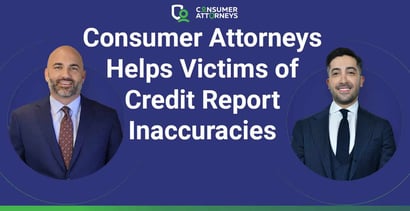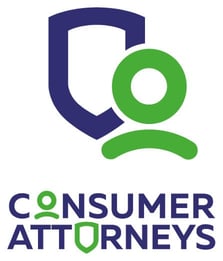
In a Nutshell: Many consumers know the three major US credit bureaus: Experian, Equifax, and TransUnion. But they may not know that dozens of reporting agencies play a significant role in consumer analysis and screening. For all the efficiencies these organizations bring to the financial system, they make many errors that can severely impact people’s lives and financial status. Fortunately, the law offers recourse to victims of credit reporting inaccuracies. Consumer Attorneys is a nationwide legal firm helping people exercise their right to clear their records and recover damages.
Many consumers are familiar with the three major US credit reporting agencies: Experian, Equifax, and TransUnion. But the consumer reporting industry extends far beyond those companies to encompass dozens of agencies.
A consumer reporting or screening agency almost always works behind the scenes when people rent an apartment or apply for jobs, loans, and insurance. Reporting firms make assessing someone’s personal and financial reputation much more efficient than the time-consuming manual process of the past.

It makes sense. Companies need to know whether prospective employees have criminal records. Landlords need to know whether prospective tenants have been evicted or have stains on their records. Creditors must know whether loan applicants have a record of paying debts on time. Insurance providers must understand factors that could impact rates.
The problem is that consumer reporting agencies aren’t perfect. They draw on public data to build their reports, and mistakes can severely impact people’s lives and reputations. The industry is also very opaque, making understanding and fixing discrepancies challenging.
Problems with inaccurate credit reports and background checks can lock people out of access and prevent them from moving forward.
Fortunately, the US Fair Credit Reporting Act (FCRA) protects people denied jobs, housing, loans, and services due to inaccurate credit reporting. The law entitles Americans to a corrected report and financial compensation. Consumer Attorneys is a nationwide law firm dedicated to helping people clear inaccuracies and recover damages.
Founding Partner Daniel Cohen said consumer reporting agencies often use data-scraping algorithms that are too imprecise. Mixups with names and personal records can dog people for years.
“They have very loose standards,” Cohen said. “People have the right to work with an attorney without any out-of-pocket costs to fix these mistakes. Lawyers like us can bill their time to the defendants.”
How Mixups and Mistakes Put People at Risk
Consumer reporting agencies analyze data from companies with direct consumer relationships and from third-party companies that scan criminal and civil databases for information they can sell. Agencies also deploy data-gathering teams.
All US citizens have a set of four unique identifiers: first name, last name, birth date, and Social Security number. But the complex algorithms the agencies use to process data into reputational profiles may not consider all four.

“If there’s a John Smith, Sr., and a John Smith, Jr., in a family at the same address, and one of them is a delinquent or has a criminal history, there’s a high probability of a mixup,” Cohen said. “If you have a common name, a report can point to a completely different person and deny you a job or opportunity.”
Inaccurate information can appear for many reasons. For example, records may not accurately represent instances when people face felony criminal charges but plead their cases to misdemeanors. Reports sometimes show people who have paid their bills still carrying a balance. Victims of identity theft may not realize until it’s too late that their records have damaging criminal activity undertaken in their name.
Cohen said identity theft can leave insidious marks that are difficult to overcome. For example, an auto dealer might deny a car loan application because of evidence on the consumer’s credit report of a delinquent mobile phone account the consumer never had. Someone from a different state with a different phone number and email address might have hijacked the consumer’s name and Social Security number.
“We do our best to help everybody — we rarely turn someone down,” Cohen said. “We plan to expand as much as possible to cover the entire nation.”
Understand Your Rights Under the Fair Credit Reporting Act
Cohen leads a team of more than 30 experienced attorneys dedicated to serving people victimized by reporting inaccuracies. The Fair Credit Reporting Act empowers legal professionals to advocate for victims, remove damaging discrepancies, and seek monetary compensation for injuries.
There’s never a cost to request a free case review. Individuals who think they may be victims should call 1-877-615-1725 or click this link. Consumer Attorneys’ costs and fees are collected from the defendants, and only if it wins the case.
“Anytime there’s an underwriting process when you’re applying for something, the FCRA governs the companies providing the data,” Cohen said. “You have recourse if you’re denied or have received less favorable terms because of mistakes and inaccurate information.”

That’s why Congress passed the law. Consumer reporting agencies have the resources to build legal costs into their business models. Unfortunately, these companies see a tradeoff between rigorous data protection and the cost of litigation that can negatively impact consumers.
“It’s the cost of doing business — they know they’ll make mistakes,” Cohen said. “It’s just about writing a check.”
Conversations with victims can be dramatic. For example, Cohen has worked with a job-seeking professional with a clean criminal record who successfully negotiated an interview and prepared to accept a new role. Imagine what it must be like to receive a sudden rejection because a mistaken background check erroneously identified the person as a sex offender.
That’s not all. For example, people with ethnic names but impeccable records and reputations often find themselves placed on terrorist watch lists.
“Even if you fix the mistake and later receive the job, that HR person may never look at you the same,” Cohen said. “Are they ever going to believe you told the truth?”
A New Lease on Life for Thousands of Victims
Cohen said credit reporting errors can start a downward spiral of events that can cause people to develop a sense of despair. One client, a DJ, rented a truck to move some gear and used his credit card to pay the $168 fee. The card processing company erroneously recorded the transaction at $16,800. Those two zeros made a whale of a difference.
The unpaid debt severely impacted the DJ’s credit report. He couldn’t purchase equipment or a car to get to gigs. He couldn’t qualify for a student loan to improve his life. The card company accused him of stealing the vehicle whenever he tried to dispute the charges.
“The guy was shot down for years with this issue and lost out on a lot of opportunities in his life,” Cohen said.
Another client with a heart condition wanted to rent a car to drive to regular hospital checkups, but his record reported him as deceased. Another had his brother’s mortgage on his credit report. The brother paid his mortgage on time, but the error disrupted the client’s debt-to-income ratio and negatively affected his credit score.
Another — a single mother experiencing domestic abuse — saved enough money to escape her situation and rent a place of her own. She had a clean criminal record, but a background check error said otherwise. She and her daughter had to return to their previous residence, putting themselves back in harm’s way again.
Consumer Attorneys has negotiated thousands of cases like these to positive outcomes. Cohen has dedicated his professional life to ensuring the FCRA protects victims of credit reporting inaccuracies.
“We’re more than just strength in numbers,” Cohen said. “We’re on a mission to help as many people as possible.”






